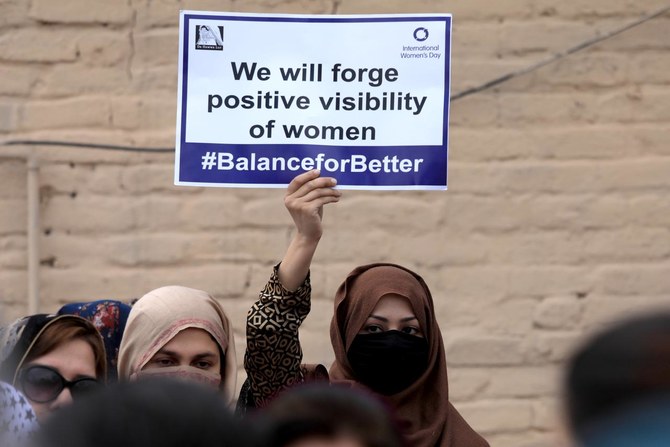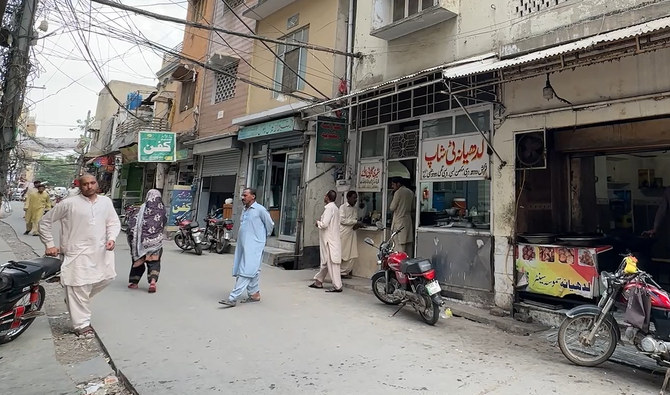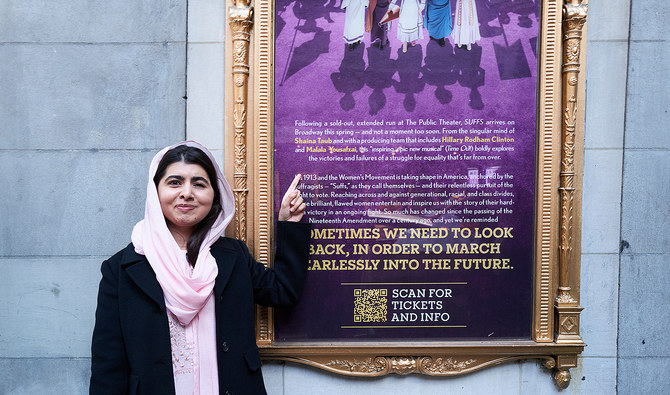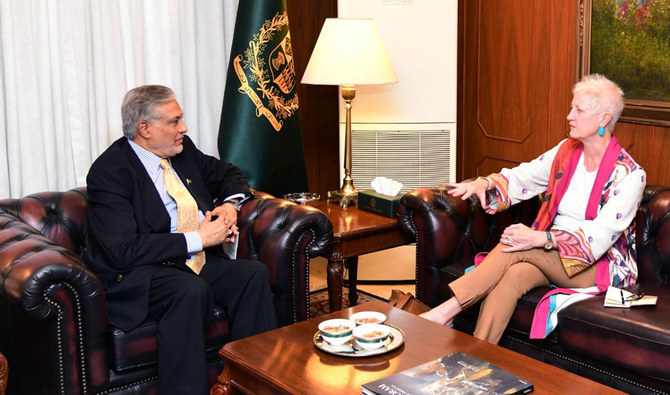ISLAMABAD: Dilshad Bibi, a woman who moved the court eight years ago against her husband for marrying for a second time, said on Tuesday the Islamabad High Court’s recent decision recommending punishment if male spouses did not get permission to remarry from an arbitration council as well as the first wife was a “big win” for women.
In a ruling on Monday, Islamabad High Court Chief Justice Athar Minallah said a man would be punished if he entered into a second marriage unless it was approved by a reconciliation council and his wife.
“It [the verdict] is a big win for me and all women who have been fighting against patriarchy and injustices in society,” Bibi told Arab News. “I never lost hope and faith in our justice system, and finally won the case after eight years of long struggle.”
Bibi and husband Liaqat Ali Meer tied the knot in May 2011. Meer remarried in January 2013 without seeking permission from his first wife or a reconciliation council whose permission is binding under Muslim family law in Pakistan.
Subsequently Bibi moved a local court against her husband which sentenced him to one month in prison and a fine of Rs5,000 ($32). The punishment was overturned by an appellate court in February 2017, after which Bibi went to the IHC.
On Monday, the IHC overturned the verdict that acquitted Bibi’s husband. Meer will now have to serve his term and pay the fine, and an appellate court will reexamine whether additional punishment is required.
“During the subsistence of an existing marriage, no man shall contract another marriage except with the previous permission in writing of the Arbitration Council,” the court ruled in a 12-page verdict, quoting a section of the Muslim Family Laws Ordinance, 1961 related to polygamy.
According to Islamabad Capital Territory Local Government Act, 2015, the federal government is responsible for establishing an “arbitration council” for the amicable settlement of disputes in a locality. The council comprises a panel of seven members, including at least one woman, who are nominated for a term of five years.
With Monday’s verdict, the court had not banned second marriage, Bibi’s lawyer Ali Hussain Bhatti said, but made it “compulsory for men to follow a due process before contracting a second marriage.”
“This is still a historic verdict and will help protect the rights of women,” he told Arab News.
Bibi said the IHC’s verdict would now serve as a precedent for future court cases and “help women get justice and equal rights.”
Having multiple wives is common in about a quarter of the world’s nations, predominantly conservative male-dominated communities in Africa and Muslim-majority countries where it is part of traditional or religious customs.
But campaigners say most polygamous marriages fuel poverty — with husbands neglecting one family over another — leaving thousands of women and children impoverished and easy prey for exploitation.
In Pakistan, polygamy is not widespread and is mostly common in rural areas in families without a male heir or in cases when men fell in love with another woman.
Rights campaigner Farzana Bari said Monday’s verdict would “encourage more women to fight for their rights and approach courts for justice in case of any unfair treatment by their husbands.”
Dr. Qibla Ayaz, chairman of Pakistan’s Council of Islamic Ideology (CII), a body that advises the government on the compatibility of laws with Islam, said Pakistani law was in contradiction with Sharia law which did not bind a man to seek permission from his first wife to contract a second marriage.
“If a man does not seek permission from his wife and the conciliation council before remarrying, he will be punished under the law of the land, but his second marriage will still remain valid,” Ayaz told Arab News, “Under Sharia law, there is no need to seek permission of the first wife.”
Punishment unless first wife and arbitration body approve second marriage, Pakistan court rules
Punishment unless first wife and arbitration body approve second marriage, Pakistan court rules

- Verdict a “big win” for me and all women fighting against patriarchy, petitioner Dilshad Bibi says
- Council of Islamic Ideology Chairman says no need to seek permission under Sharia law
In Rawalpindi, 77-year-old tea shop named after India’s Ludhiana is still a hit with customers

- Ludhiana Tea Shop owners migrated from India’s northwestern city at the time of Partition in 1947
- Customers say they come from far-off places to relish the taste of tea at the shop which they find unique
RAWALPINDI: At a small tea shop in Pakistan’s garrison city of Rawalpindi, Nazir Hussain pours piping hot tea from a kettle into small cups and hands them away to eager customers, many of them regulars who have been frequenting the shop for decades.
This is the scene from a typical evening at Ludhiana Tea Shop, located in the narrow streets of Rawalpindi’s old Lal Kurti area. The tea shop takes its name after the northwestern Indian city of Ludhiana, from where its owners migrated to Rawalpindi in 1947.
“My grandfather named this business in the memory of his hometown in India,” Hussain, who took charge of the shop in 1976, told Arab News, adding that he also sold dairy products and ghee.
“We are a family of milk sellers,” he said. “In India, we used to do the same. We were milk sellers and we used to own buffaloes.”
The shop has been serving tea to customers for the past 77 years. Agha Asghar Saeed, 72, is one of them and has been coming here since he was young.
“I was born here. I spent my childhood here, my youth and now my old age as well,” he told Arab News. “I’ve been having this tea since then.”
During the Muslim holy month of Ramadan, Saeed would break his fast at home but have tea at Ludhiana Tea Shop.
“I am addicted to this tea,” he explained.
But what inspires such loyalty in customers?
“You have to buy good quality milk,” Hussain said, adding that he purchased pure and organic milk for his shop that was a bit expensive. “Not everyone knows how to buy good milk.”
He maintained that most milk sellers in Pakistan did not sell pure milk, making him take several sips while buying to check the fat content.
Just like the milk, he continued, the quality of the tea leaves was also important.
The price of one cup of tea used to be around five paisas several years ago.
“Now, we sell it for Rs60 (22 cents),” he added.
The rich taste of Ludhiana Tea Shop means Muhammad Hasnain and his friends visit it every day rather than go to other tea shops in the neighborhood.
“Obviously, everybody wants a good bang for their buck,” Hasnain told Arab News. “The most important thing for anyone is that the quality should be good, and both quality and quantity are good here.”
Ludhiana Tea Shop offers customers deep-fried sweet and savory snacks, such as pakoras, samosas, jalebis and spring rolls, delectable items popularly consumed in Pakistan with tea.
Muhammad Shoaib Khan, a man in his 30s, informed he visited the shop with his friends at least a couple of times every day.
“We come on our bikes and travel for at least 1.5 kilometer on every trip,” Khan told Arab News. “It roughly adds up to 6 kilometers.”
Despite the cost of petrol, which has surged in recent times, Khan said he visited the shop for tea because it was worth it.
Hussain said he understood why customers came from far-off places just to have a cup of tea at his 77-year-old shop.
“Everyone cannot make good tea,” he said. “They don’t pour their heart in it. They lack passion. Making good tea is something that can only be done from the heart.”
Malala Yousafzai vows support for Gaza after backlash over Broadway musical

- Yousafzai was criticized in Pakistan for co-producing a play with Hillary Clinton who supports Israel’s Gaza campaign
- The Nobel laureate says ‘we do not need to see more dead bodies’ to understand the urgency of a ceasefire in Gaza
LAHORE: Nobel laureate Malala Yousafzai on Thursday condemned Israel and reaffirmed her support for Palestinians in Gaza, after a backlash in her native Pakistan over a Broadway musical she co-produced with former US Secretary of State Hillary Clinton.
Yousafzai, who was awarded the Nobel Peace Prize in 2014, has been condemned by some for partnering with Clinton, an outspoken supporter of Israel’s war against Hamas.
The musical, titled “Suffs,” depicts the American women’s suffrage campaign for the right to vote in the 20th century and has been playing in New York since last week.
“I want there to be no confusion about my support for the people of Gaza,” Yousafzai wrote on X, the former Twitter. “We do not need to see more dead bodies, bombed schools and starving children to understand that a ceasefire is urgent and necessary.”
She added: “I have and will continue to condemn the Israeli government for its violations of international law and war crimes.”
Pakistan has seen many fiercely emotional pro-Palestinian protests since the war in Gaza began last October.
Yousafzai’s “theatre collaboration with Hillary Clinton – who stands for America’s unequivocal support for genocide of Palestinians – is a huge blow to her credibility as a human rights activist,” popular Pakistani columnist Mehr Tarar wrote on social media platform X on Wednesday.
“I consider it utterly tragic.”
Whilst Clinton has backed a military campaign to remove Hamas and rejected demands for a ceasefire, she has also explicitly called for protections for Palestinian civilians.
Yousafzai has publicly condemned the civilian casualties and called for a ceasefire in Gaza.
The New York Times reported the 26-year-old wore a red-and-black pin to the “Suffs” premier last Thursday, signifying her support for a ceasefire.
But author and academic Nida Kirmani said on X that Yousafzai’s decision to partner with Clinton was “maddening and heartbreaking at the same time. What an utter disappointment.”
The war began with an unprecedented Hamas attack on Israel on October 7 that resulted in the deaths of around 1,170 people, according to an AFP tally of Israeli official figures. Hamas militants also abducted 250 people and Israel estimates 129 of them remain in Gaza, including 34 who the military says are dead.
Clinton served as America’s top diplomat during former president Barack Obama’s administration, which oversaw a campaign of drone strikes targeting Taliban militants in Pakistan and Afghanistan’s borderlands.
Yousafzai earned her Nobel Peace Prize after being shot in the head by the Pakistani Taliban as she pushed for girls’ education as a teenager in 2012.
However, the drone war killed and maimed scores of civilians in Yousafzai’s home region, spurring more online criticism of the youngest Nobel Laureate, who earned the prize at 17.
Yousafzai is often viewed with suspicion in Pakistan, where critics accuse her of pushing a Western feminist and liberal political agenda on the conservative country.
Pakistan commends UAE leadership for ‘swift’ response to record-breaking rains

- Pakistan’s foreign minister telephones UAE counterpart, expresses sympathy over devastation caused by torrential rains
- Heavy rains lashed UAE last week, turning streets into rivers and hobbling Dubai airport, world’s busiest for global passengers
ISLAMABAD: Pakistan’s Foreign Minister Ishaq Dar on Wednesday commended the United Arab Emirates (UAE) leadership for its swift and efficient response to the devastation caused by record-breaking rains in the desert country.
Heavy rains lashed the desert country last week, turning streets into rivers and hobbling Dubai airport, the world’s busiest for international passengers.
The rainfall was the UAE’s heaviest since records began 75 years ago, dumping two years’ worth of rain on the desert country.
“Foreign Minister Ishaq Dar held telephone conversation with Foreign Minister His Highness Sheikh Abdullah Bin Zayed of United Arab Emirates to express deepest sympathy on the devastation caused by recent torrential rains,” Pakistan’s Ministry of Foreign Affairs (MoFA) said.
“He commended the leadership of the UAE for the swift, efficient and timely administrative response to this natural calamity,” it added.
The foreign ministry said both representatives also exchanged views on matters of bilateral and global importance.
Pakistan’s PM Sharif last Friday telephoned UAE President Sheikh Mohamed bin Zayed Al-Nahyan, urging both countries to collaborate to tackle the impacts of climate change.
Sharif had lauded the UAE president for his “outstanding leadership qualities” and strong commitment to ensure the welfare of the Emirati people.
Pakistan has been prone to natural disasters and consistently ranks among one of the most adversely affected countries due to the effects of climate change. Torrential rains have killed more than 90 people in the South Asian country this month, according to authorities.
Malala Yousafzai faces backlash for Clinton musical co-credit

- Malala Yousafzai co-produced “Suffs” musical with Hillary Clinton, which depicts American women’s struggle for right to vote
- Yousafzai has been condemned by some for partnering with Clinton, an ardent supporter of Israel’s war on Palestine
LAHORE: Nobel laureate Malala Yousafzai faced a backlash in her native Pakistan on Wednesday, after the premier of a Broadway musical she co-produced with former US Secretary of State Hillary Clinton.
The musical, titled “Suffs” and playing in New York since last week, depicts the American women’s suffrage campaign for the right to vote in the 20th century.
However Yousafzai, who was awarded the Nobel Peace Prize in 2014, has been condemned by some for partnering with Clinton, an outspoken supporter of Israel’s war against Hamas.
Pakistan has seen many fiercely emotional pro-Palestinian protests since the war in Gaza began last October.
“Her theater collaboration with Hillary Clinton — who stands for America’s unequivocal support for genocide of Palestinians — is a huge blow to her credibility as a human rights activist,” popular Pakistani columnist Mehr Tarar wrote on social media platform X.
“I consider it utterly tragic.”
Whilst Clinton has backed a military campaign to remove Hamas and rejected demands for a ceasefire, she has also explicitly called for protections for Palestinian civilians.
Yousafzai has publically condemned the civilian casualties and called for a ceasefire in Gaza.
The New York Times reported the 26-year-old wore a red-and-black pin to the “Suffs” premier last Thursday, signifying her support for a ceasefire.
But author and academic Nida Kirmani said on X that Yousafzai’s decision to partner with Clinton was “maddening and heartbreaking at the same time. What an utter disappointment.”
Israel’s military offensive has killed at least 34,262 people in Gaza, mostly women and children, according to the Hamas-run territory’s health ministry.
The war began with an unprecedented Hamas attack on October 7 that resulted in the deaths of around 1,170 people, according to an AFP tally of Israeli official figures.
Clinton served as America’s top diplomat during former president Barack Obama’s administration, which oversaw a campaign of drone strikes targeting Taliban militants in Pakistan and Afghanistan’s borderlands.
Yousafzai earned her Nobel Peace Prize after being shot in the head by the Pakistani Taliban as she pushed for girl’s education as a teenager in 2012.
However the drone war killed and maimed scores of civilians in Yousafzai’s home region, spurring more online criticism of the youngest Nobel Laureate, who earned the prize at 17.
Yousafzai is often viewed with suspicion in Pakistan, where critics accuse her of pushing a Western feminist and liberal political agenda on the conservative country.
Pakistan’s foreign minister calls for early resumption of PIA flights to Europe

- Foreign Minister Ishaq Dar meets EU ambassador to discuss bilateral ties, trade and matters of mutual interest
- PIA flights to Europe and the UK have been suspended since 2020 following Pakistan’s infamous pilot license scandal
ISLAMABAD: Pakistan’s Foreign Minister Ishaq Dar on Wednesday stressed the resumption of direct flights from the country’s national airline to Europe, the foreign ministry said, in his meeting with EU Ambassador Riina Kionka during which both sides discussed bilateral relations, trade and matters of mutual interest.
PIA flights to Europe and the UK have been suspended since 2020 after the EU’s Aviation Safety Agency revoked the national carrier’s authorization to fly to the bloc following a pilot license scandal that rocked the country. The issue resulted in the grounding of 262 of Pakistan’s 860 pilots, including 141 of PIA’s 434.
Kionka and Dar discussed Pakistan-EU bilateral ties and important issues of mutual interest during their meeting, Pakistan’s Ministry of Foreign Affairs (MoFA) said. Dar told Kionka Pakistan views the EU as a “valued partner” and an important factor of stability during the current volatile times.
“FM emphasized the significance of direct flights between Pakistan and European countries in view of large diasporas,” MoFA said. “In this regard, he stressed on the need for an early resumption of PIA flights to Europe.”
Both sides also expressed satisfaction over the “significant progress” of Pakistan-EU institutional mechanisms and resolved to maintain the upward trajectory of their relations by increasing their high-level interactions.
“FM vowed to further strengthen the existing strategic partnership in all areas, inter alia, trade, migration, climate change,” MoFA said.
“The EU side assured their full cooperation to Pakistan in achieving the objectives of economic diplomacy.”
The EU is Pakistan’s second most important trading partner, accounting for over 14 percent of the country’s total trade and absorbing 28 percent of Pakistan’s total exports. Pakistani exports to the EU are dominated by textiles and clothing.
Pakistan’s GSP+ status is a special trade arrangement offered by the EU to developing economies in return for their commitment to implement 27 international conventions on human rights, environmental protection and governance.










